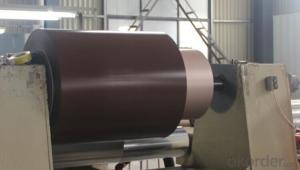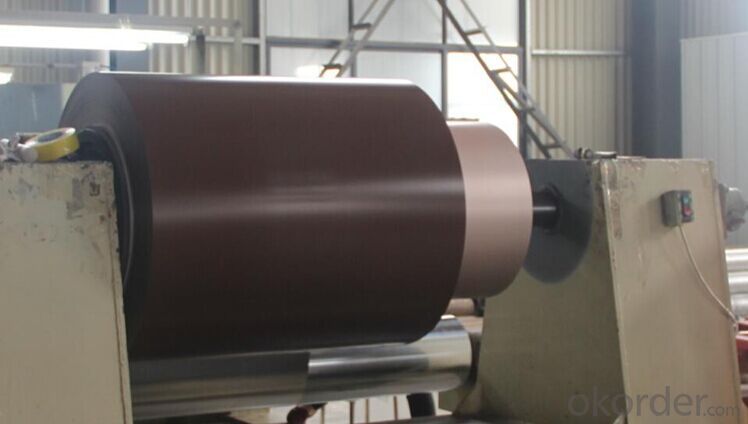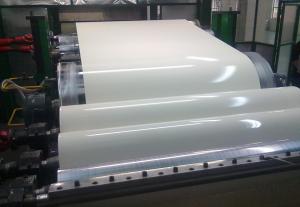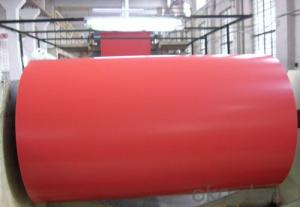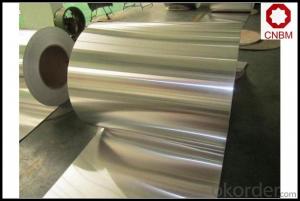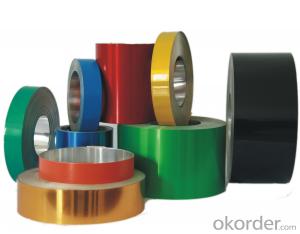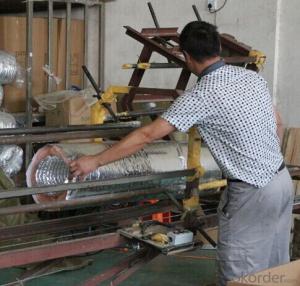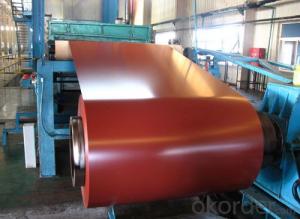York Aluminum Coil - Larger Image Color Coated Aluminum Sheet Coil for Roofing and Cladding System
- Loading Port:
- China main port
- Payment Terms:
- TT OR LC
- Min Order Qty:
- 10 m.t
- Supply Capability:
- 1000 m.t/month
OKorder Service Pledge
OKorder Financial Service
You Might Also Like
Specification
The Specification of Coated Aluminium Coil:
Application:The aluminium coil can be used to ACP,wall cladding, facades, roofs and canopies, ceilings, signboards, blind window, display platforms, electrical panels , etc
| Alloy | 1050 1060 1100 3003 3004 3005 5005 8011 etc |
| Temper | H12,H14,H16,H18,H24,H26 |
| Thickness | 0.02mm - 1.2mm |
| Width | Standard width: 1240mm |
| Special width: 1300mm,1520mm,1570mm,1595mm | |
| Diameter | Standard dia:1200mm |
| Interior dia:150mm,405mm,505mm | |
| Weight | 2.5 T/coils, 3.0 T/coil |
| Coating | PE, PVDF,ACRYLIC |
| Surface | Embossed, mill finish, coated |
| Color | As to code RAL |
| Gloss | 10-90% (EN ISO-2813:1994) |
| Coating Thickness | PE:more than 18 micron |
| PVDF: more than 25 micron | |
Coating Hardness (pencil resistance) | More than 2h |
| Coating Adhesion | 5J(en iso-2409:1994) |
| Impact Resistance | No peeling or cracking(50 kg/cm,ASTMD-2794:1993) |
PVDF Coated:
Coated Aluminum Coil features with super durability and weather resistance,and better properties to anti-acid,anti-alkali,keeping more than 15 years without fading in using as external wall cladding.
The Main Features of Aluminium Coated Coil:
1.High temperature resistant
2.Weathering resistance
3.Scrubbing resistant
4.Sound insulation
The Images of Aluminium Coated Coil:

FAQ:
Q: Can you provide free samples?
A: Yes, free samples will be sent to you on freight at destination.
Q: Can I get your latest catalogue?
A: Yes, it will be sent to you in no time.
Q: What is the MOQ?
A: 5 tons
Q: What are your payment terms?
A: We accept L/C,T/T, West Union,etc.
- Q: This question asks for a comparison between cold rolling and hot rolling processes, specifically in the context of steel wire production for coilings.
- <p>Cold rolling and hot rolling are two distinct processes used in the manufacturing of steel wires for coilings. Hot rolling is performed at high temperatures, typically above the recrystallization temperature of the steel, which allows the material to be shaped more easily. This process results in a more ductile and less hard steel, which can be beneficial for certain applications. However, hot-rolled steel may have a rougher surface and may require further processing to achieve desired dimensions and surface finish. Cold rolling, on the other hand, is done at room temperature, which imparts a harder and smoother surface to the steel. It is more precise and results in tighter tolerances, making it suitable for applications requiring high strength and precision. Cold-rolled steel also has better surface finish and dimensional accuracy compared to hot-rolled steel. However, cold rolling is more energy-intensive and may not be suitable for very thick materials due to the increased hardness of the steel at room temperature.</p>
- Q: i used hf acid to clean the rails on my trailer and it left black streaks on the alluminum... uld it be the type of aluminum alloy???
- Aluminum will oxidize. Not like steel though, that forms the red orange rust (iron oxide) that will eventually eat through thin steel. When aluminum oxidizes, it leaves a thin cloudy film on the surface. That's why nice new shiny diamond plate gets dull after being exposed for some time. It can be removed by some chemicals, apparently your hf acid. When the acid breaks down the cloudy oxidize layer, it may turn into a black residue. You'll be left with a clean aluminum surface that will, over time, oxidize and get that cloudy film again. It could also be waste compound of your hf acid etching the surface. Check to see whether the acid you're using will etch or clean an aluminum surface.
- Q: Can aluminum coils be used in vacuum applications?
- Indeed, aluminum coils are capable of being employed in vacuum applications. Aluminum, being a frequently utilized substance in vacuum systems, possesses exceptional attributes including low outgassing, high thermal conductivity, and commendable corrosion resistance. Consequently, these qualities render aluminum coils suitable for a diverse array of vacuum applications, encompassing, but not restricted to, vacuum chambers, vacuum pumps, cryogenic systems, and particle accelerators. Nevertheless, it is crucial to acknowledge that aluminum may react with particular gases or chemicals. Hence, it is imperative to carefully evaluate the specific necessities and compatibility of the vacuum application prior to employing aluminum coils.
- Q: What are the regulations and standards governing the production of aluminum coils?
- The production of aluminum coils is governed by a variety of regulations and standards to ensure product quality, safety, and environmental sustainability. These regulations may vary depending on the country or region, but there are some common industry standards that are widely recognized. One of the primary regulations governing the production of aluminum coils is related to product quality and specifications. Aluminum coils must meet specific standards set by organizations such as the American Society for Testing and Materials (ASTM) or the International Organization for Standardization (ISO). These standards define the physical and chemical properties that the aluminum coils must possess, such as thickness, width, tensile strength, and chemical composition. In terms of safety, there are regulations in place to protect workers and facilities involved in the production process. Occupational Safety and Health Administration (OSHA) regulations, for example, outline safety measures and requirements to prevent accidents and ensure safe working conditions. This may include guidelines for handling and storing aluminum coils, personal protective equipment requirements, and emergency response protocols. Additionally, environmental regulations play a crucial role in the production of aluminum coils. These regulations aim to minimize the impact of the production process on the environment and ensure sustainable practices. For instance, there may be regulations regarding the treatment and disposal of waste materials, the use of energy-efficient equipment, and the reduction of greenhouse gas emissions. Furthermore, industry-specific organizations such as the Aluminum Association in the United States or the European Aluminium Association in Europe also establish voluntary standards and best practices for the production of aluminum coils. These organizations work closely with manufacturers to develop guidelines for quality control, sustainability, and continuous improvement in the industry. Overall, the production of aluminum coils is governed by a combination of regulations and standards that encompass product quality, safety, and environmental considerations. Compliance with these regulations ensures the production of high-quality aluminum coils that meet customer requirements and contribute to a sustainable and responsible industry.
- Q: How do aluminum coils compare to copper coils in terms of conductivity?
- Aluminum coils and copper coils have different conductivity properties. Copper is known for its exceptional electrical conductivity, making it the preferred choice for applications where maximum efficiency is crucial, such as electrical wiring and motor windings. Copper coils have a significantly higher electrical conductivity compared to aluminum coils. This means that copper coils can transmit electricity more efficiently, resulting in lower power losses and improved overall performance. On the other hand, aluminum coils have lower electrical conductivity compared to copper coils. While aluminum is still a good conductor of electricity, it is not as efficient as copper. This means that aluminum coils may experience higher power losses and lower efficiency compared to their copper counterparts. However, aluminum coils have their own advantages in certain applications, such as being lighter and more cost-effective. Ultimately, the choice between aluminum and copper coils depends on the specific requirements of the application, with copper being favored for its superior conductivity properties.
- Q: What are the different coil lengths available for aluminum coils?
- Aluminum coils come in a variety of lengths, depending on the specific application and requirements. Typically, these lengths range from a few feet to several hundred feet. The most commonly used coil lengths in industries like HVAC, automotive, and construction are 50 feet, 100 feet, and 250 feet. However, it is worth mentioning that custom coil lengths can also be produced to meet the customer's specific needs. These custom lengths may vary depending on factors such as coil thickness, width, and intended use. Ultimately, the available coil lengths for aluminum coils are adaptable and can be customized to meet the demands of various industries and applications.
- Q: Can aluminum coils be used in signage applications?
- Yes, aluminum coils can be used in signage applications. Aluminum is a popular material for signage due to its durability, lightweight nature, and resistance to corrosion. It can be easily formed into various shapes and sizes, making it suitable for different types of signage, including billboards, nameplates, and outdoor signs. Additionally, aluminum can be painted or laminated to achieve different visual effects and enhance the overall appearance of the signage.
- Q: This question asks about the differences between 3D printed aluminum coils and traditionally manufactured aluminum coils.
- <p>Yes, there are differences between 3D printed and regular aluminum coils. 3D printed aluminum coils are manufactured using additive manufacturing, which allows for complex geometries and customization. They can be produced with less material waste and can be designed for specific applications. Traditionally manufactured aluminum coils, on the other hand, are typically made through processes like rolling, which may not offer the same level of design flexibility. 3D printed coils may have different mechanical properties due to the layer-by-layer manufacturing process, potentially resulting in varying strength and durability. Additionally, 3D printed coils might have a higher cost due to the specialized equipment and materials required for additive manufacturing.</p>
- Q: What are the different protective film options for aluminum coils?
- Aluminum coils have a range of protective film options available, each with its own benefits and suitability for different applications. Some commonly used options include: 1. PVC Film: These films are highly resistant to moisture, chemicals, and abrasion, making them a popular choice for protecting aluminum coils. They offer excellent surface protection and come in various thicknesses and adhesive strengths. 2. PE Film: Another popular choice, PE films provide good resistance to moisture and UV radiation. They are generally more cost-effective than PVC films and are available in different grades, such as LDPE and LLDPE. 3. PP Film: Known for their tear resistance and high tensile strength, PP films are ideal for applications where coils may undergo rough handling or transportation. They offer good protection against mechanical damage. 4. PET Film: PET films offer exceptional clarity and transparency, making them perfect for applications that require visual inspection of the coils. They also provide good resistance to heat, chemicals, and abrasion. 5. Adhesive Coatings: In addition to films, adhesive coatings can be used to protect aluminum coils. These coatings are directly applied to the coil's surface and create a protective layer against moisture, corrosion, and scratching. When choosing a protective film for aluminum coils, it is crucial to consider factors such as the intended application, environmental conditions, handling processes, and desired level of protection. Seeking guidance from a supplier or manufacturer can help determine the most suitable option for specific requirements.
- Q: How are aluminum coils used in the electrical industry?
- Aluminum coils are widely used in the electrical industry for various applications such as transformers, motors, generators, and electrical transmission systems. These coils are used to create electromagnetic fields, which are essential for the functioning of these electrical devices. Additionally, aluminum coils are preferred due to their lightweight, high thermal conductivity, and cost-effectiveness compared to other materials.
Send your message to us
York Aluminum Coil - Larger Image Color Coated Aluminum Sheet Coil for Roofing and Cladding System
- Loading Port:
- China main port
- Payment Terms:
- TT OR LC
- Min Order Qty:
- 10 m.t
- Supply Capability:
- 1000 m.t/month
OKorder Service Pledge
OKorder Financial Service
Similar products
Hot products
Hot Searches
Related keywords
